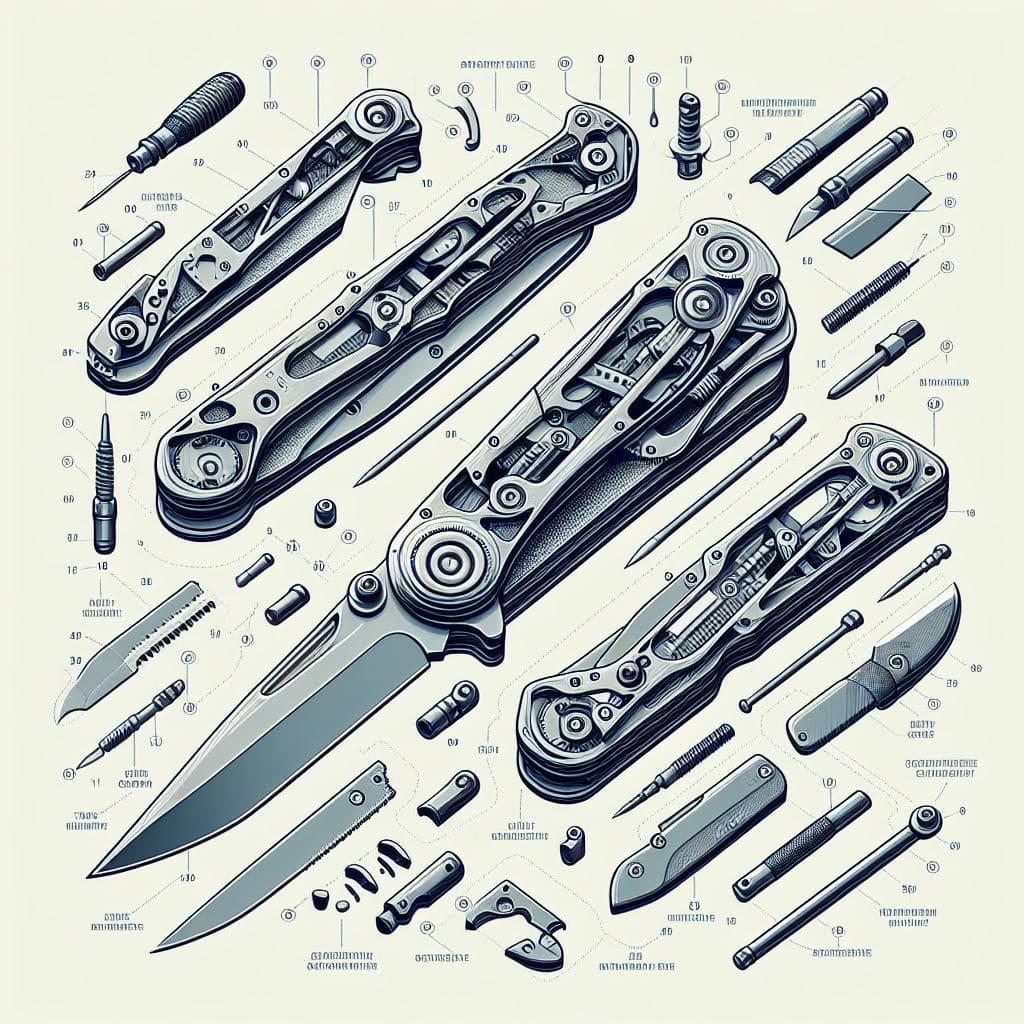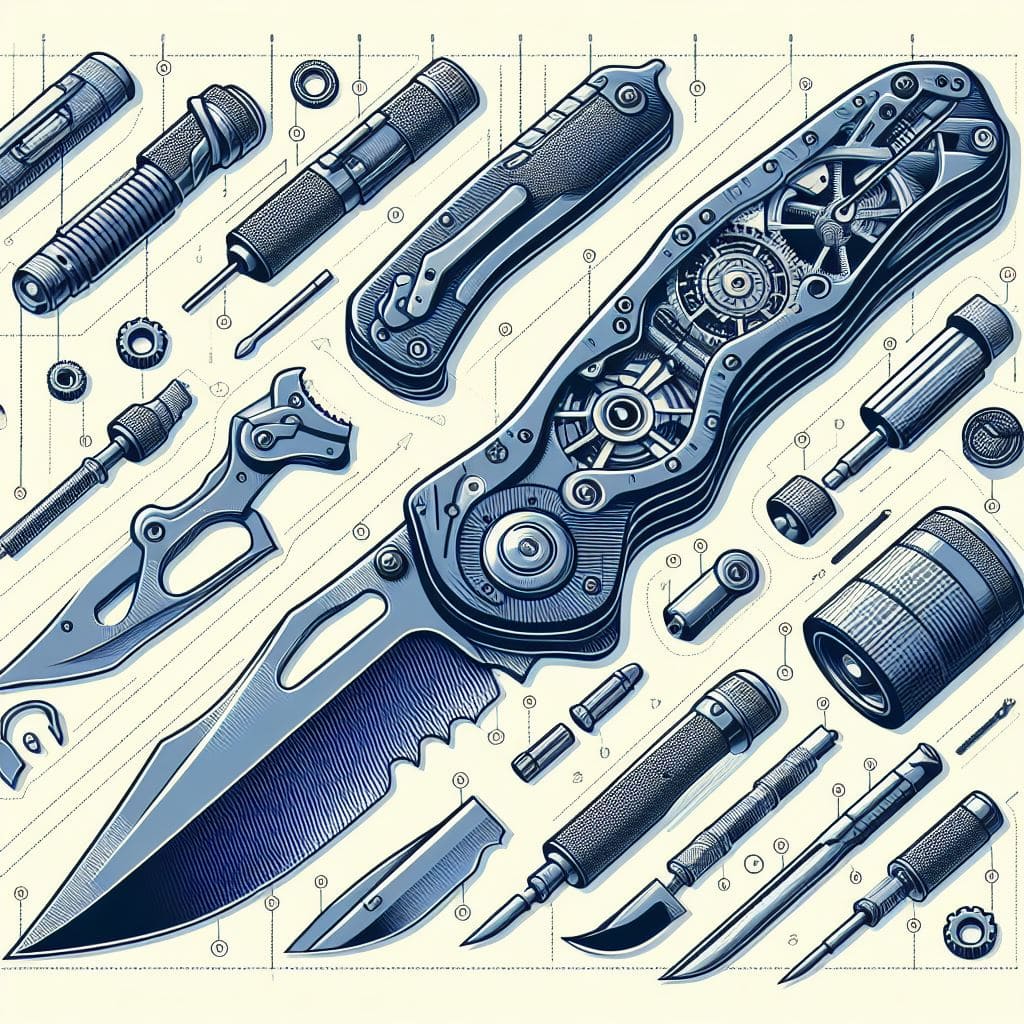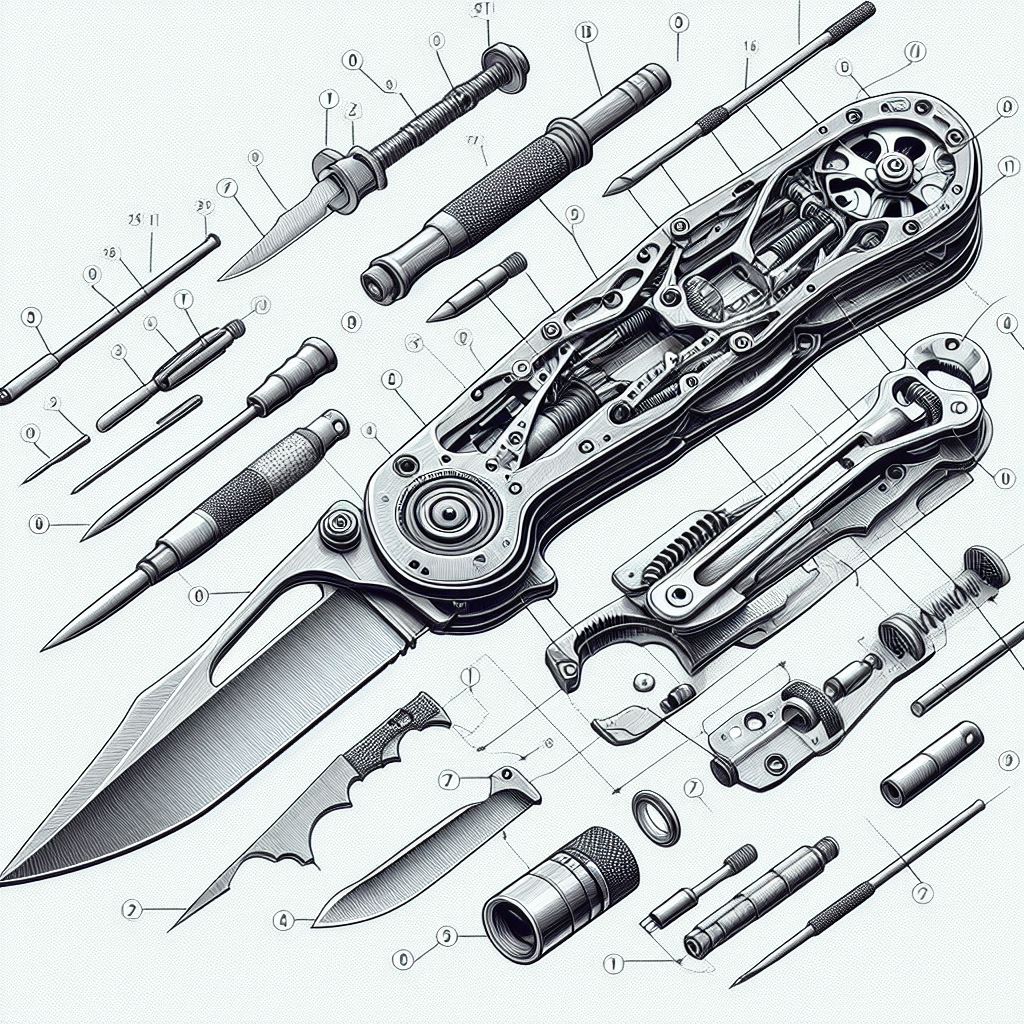A gravity knife opens with the force of gravity or inertia when the blade slides out of the handle. It locks into place once fully extended, ready for use.
Understanding the mechanism behind a gravity knife can deepen one’s appreciation for this unique tool. Initially designed for paratroopers to quickly cut parachute cords, gravity knives have since found a broader audience. Their distinct feature is simple yet ingeniously practical: a blade housed inside a handle that requires no thumb pressure or separate locking mechanism.
By simply pointing the knife downward and releasing the blade, gravity does the work, allowing for one-handed operation. With a solid locking mechanism, the blade secures firmly, transforming the knife from compact to a fully-functional tool in an instant. Practical, efficient, and often legal in various jurisdictions, gravity knives offer a combination of quick deployment and convenience that resonates with both outdoor enthusiasts and everyday carriers.

Introduction To Gravity Knives
An elusive tool with a controversial edge, gravity knives have captivated both enthusiasts and the general public alike. These unique blades operate on a mechanism that sets them apart from traditional folding knives. Primarily used for swift, one-handed opening, they have evolved significantly from their historical roots. However, this evolution has also been accompanied by a swirl of legal debates and restrictions. In this section, we’ll unravel the enigma of gravity knives, from their definition and history to the contentious conversations surrounding their legality.
Defining A Gravity Knife
A gravity knife, characterized by its ingenious yet simple opening mechanism, allows the blade to drop out of the handle with a simple movement that harnesses gravity. this attribute dissents from typical manual folding knives. To activate, one typically holds the knife by the handle, allowing the blade to freely slide out and lock into place. This swift action makes it remarkably advantageous for tasks requiring immediate blade access.
Historical Context And Evolution
The gravity knife’s ancestry can be traced back to the Second World War, where they were initially intended as a paratrooper’s tool to quickly cut free from tangled parachutes.
- Originated for military use and spread to civilian sectors
- Morphed in design and function over the decades
- Modern iterations are sleek, incorporating advanced materials and technology
With time, the gravity knife’s design and purpose saw a transformation, with adaptations emerging to suit the needs of various users, from adventurers to workers who value its efficiency and ease of use.
Legal Aspects And Controversies
The gravity knife’s nifty blade ejection mechanism has not been without its legal challenges. Despite its practicality in certain professions, it has been the subject of scrutiny in various jurisdictions.
| Region | Legal Status |
|---|---|
| New York | Previously banned, law overturned in 2019 |
| United Kingdom | Considered an offensive weapon, generally illegal |
| Germany | Restricted use, except for authorized personnel |
This legislative variability underscores the gravity knife’s contentious place in society while highlighting the balance between utility and regulated control.
Mechanics Of Gravity Knives
Welcome to the intricate world of gravity knives, a fascinating piece of craftsmanship that has delighted and served users for decades. These unique knives operate on a simple yet ingenious mechanism that harnesses the force of gravity to deploy the blade. Today, let’s delve into the ‘Mechanics of Gravity Knives’ to understand what sets them apart from their peers, and how their elegant design makes them a reliable choice for various cutting tasks.
Anatomy Of A Gravity Knife
A gravity knife is composed of several crucial components that come together to define its functionality. At its core, the knife consists of:
- A handle, which is often designed to provide a comfortable grip and houses the internal mechanism.
- A blade that effortlessly slides in and out of the handle when activated.
- A locking mechanism to ensure the blade stays open when in use and retracts safely when not.
- An activation lever or button that triggers the movement of the blade.
Principles Of Operation
The gravity knife utilizes a straightforward yet effective mechanism. The operation involves:
- Releasing a lock by pressing a button or lever usually located on the handle.
- Pointing the handle downward, allowing gravity or a flick of the wrist to extend the blade from the handle.
- Locking the blade in place automatically when fully extended for safe, efficient use.
- Returning the blade into the handle by releasing the lock and utilizing gravity once more to retract it after use.

Comparing Gravity Knives With Other Folding Knives
| Knife Type | Opening Mechanism | Locking System | Use Case |
|---|---|---|---|
| Gravity Knives | Gravity or a flick of the wrist | Automatic locking when fully extended | Quick, one-handed opening when multitasking |
| Manual Folding Knives | Thumb stud or hole, requires manual opening | Various, including liner and frame locks | General-purpose use, requiring two hands to open |
| Assisted Opening Knives | Spring-assisted mechanism | Locks upon deployment, similar to gravity knives | Quick, one-handed open similar to gravity knives but with spring assistance |
| Switchblades | Button or switch-triggered spring mechanism | Automatic lock when deployed | Instant blade deployment for tactical or emergency situations |
In summary, the gravity knife stands out for its unique gravity-powered deployment. Unlike manual folders, there’s no need for two-handed operation. In comparison to assisted knives and switchblades, gravity knives require no spring and offer a more fluid motion with fewer parts that can falter. The simplicity and reliability of gravity knives have made them a constant favourite among collectors and enthusiasts alike.
Practical Applications And User Safety
Understanding the mechanics behind a gravity knife offers insight into its versatility and explains the necessary precautions for handling. Often chosen for its reliable one-handed deployment, the gravity knife finds a diverse range of applications, from daily tasks to rescue operations. Safety emerges as a critical concern given the unique opening mechanism, making it imperative for users to follow proper guidelines. Attention to maintenance ensures the knife functions effectively over time without compromising user safety.
Common Uses Of Gravity Knives
- Outdoor Adventures: Enthusiasts often use gravity knives for quick access while climbing, hiking, or camping.
- Emergency Services: First responders value gravity knives for their rapid deployment in critical situations.
- Utility Tasks: Whether it’s cutting rope or opening boxes, the ease-of-use makes the gravity knife a go-to tool.
Safety Guidelines And Best Practices
Responsible use of gravity knives is mandatory to prevent accidents. Users should:
- Always direct the blade away from the body during deployment and use.
- Engage the locking mechanism, if available, to prevent accidental closure.
- Be aware of their surroundings to avoid injuring bystanders.
- Use carry cases or sheaths to transport the knife when not in use.
Maintenance And Care For Longevity
| Maintenance Task | Frequency | Importance |
|---|---|---|
| Cleaning | After each use | Prevents build-up of debris and maintains function |
| Lubrication | Monthly | Ensures smooth blade deployment |
| Inspection | Regularly | Identifies potential issues early |
| Sharpening | As needed | Keeps the cutting edge effective and safe |
Users should keep their gravity knives free from rust and damage by applying these maintenance procedures. A well-maintained knife is safer to use and has an extended lifespan.

Conclusion
Understanding the mechanics of a gravity knife is key for enthusiasts and collectors alike. These blades rely on gravity for deployment, offering simplicity and speed. Remember, responsible handling is paramount for safety. For those captivated by its unique operation, a gravity knife adds a fascinating piece to any collection, while adhering to legal restrictions is essential.
Frequently Asked Questions For How Does A Gravity Knife Work
What Defines A Gravity Knife?
A gravity knife is defined by its blade, which extends from the handle using gravity or inertia and locks into place with a lever or button.
What Are Gravity Knives Illegal?
Gravity knives are illegal due to their quick, one-handed deployment, which poses safety and crime risks. Laws categorize them as concealed weapons, augmenting their potential for illegal activities.
What Is The Most Illegal Knife?
The most illegal knife varies by jurisdiction but generally includes switchblades, butterfly knives, and gravity knives. Local laws should be checked for specifics.
Why Are Switchblades Illegal?
Switchblades are illegal due to their association with crime and quick deployment capability, posing safety concerns. Legislation often deems them weapons rather than tools, prompting bans.







